 Petzlover
Petzlover Grand Bleu de Gascogne is originated from France but Sapsali is originated from North Korea. Grand Bleu de Gascogne may grow 12 cm / 5 inches higher than Sapsali. Grand Bleu de Gascogne may weigh 15 kg / 34 pounds more than Sapsali. Both Grand Bleu de Gascogne and Sapsali has same life span. Both Grand Bleu de Gascogne and Sapsali has same litter size. Grand Bleu de Gascogne requires Low Maintenance. But Sapsali requires Moderate Maintenance
Grand Bleu de Gascogne is originated from France but Sapsali is originated from North Korea. Grand Bleu de Gascogne may grow 12 cm / 5 inches higher than Sapsali. Grand Bleu de Gascogne may weigh 15 kg / 34 pounds more than Sapsali. Both Grand Bleu de Gascogne and Sapsali has same life span. Both Grand Bleu de Gascogne and Sapsali has same litter size. Grand Bleu de Gascogne requires Low Maintenance. But Sapsali requires Moderate Maintenance
 The Grande Bleu de Gascogne is a dog which has descended from a line of French hounds. Originating in France, the dog is actually more common in the United States than in France.
The Grande Bleu de Gascogne is a dog which has descended from a line of French hounds. Originating in France, the dog is actually more common in the United States than in France.
They were bred to hunt, and today they continue to be used for hunting, but they double up as loyal pets too.
It is believed that they descended from dogs such as the St. Hubert Hound and the English Southern Hound. The dog itself has had an influence on the development of several scent-hound breeds.
In the United States, the Grande Bleu de Gascogne was bred in the 18th century already, displaying typical pack hound behavior.The dog isn't recognized by the AKC but he is recognized by other kennel clubs as a scenthound.
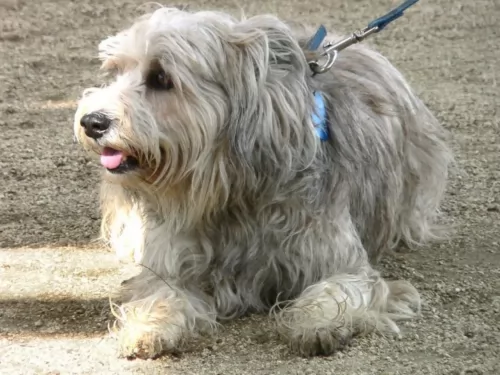 Early documentation of this dog tells us that it has been around for centuries and is therefore an ancient breed.
Early documentation of this dog tells us that it has been around for centuries and is therefore an ancient breed.
The Sapsali is a dog that comes from Korea and is also known as the Lion Dog, Sapsaree and Sapsal Gae. It is believed that these dogs were used to dispel evil spirits or ghosts.
The dog was given the status as National Treasure by the Korean Government in 1992 and is recognized by a number of local Korean dog societies. The dog isn’t however recognized by any of the major kennel clubs, but is affiliated with the Federation Cynologique Internationale (FCI).
When Korea was under Japanese rule, the dogs were slaughtered to make coats for its military and almost became extinct. Kennels were set up and the dog was revived again in the 1980s.
 The Grand Bleu de Gascogne is a large dog, standing at 65–72cm with the female usually being slightly smaller at 62–68cm. The dog weighs about 36 to 42kg.
The Grand Bleu de Gascogne is a large dog, standing at 65–72cm with the female usually being slightly smaller at 62–68cm. The dog weighs about 36 to 42kg.
He has a lean, muscular body with long legs, long ears and with a strong, noble appearance. The coat is short and smooth and the color of the coat is white and black mottled. In some instances, there'll be large patches of black over the back of the dog. The head and neck area can also be black. There are tan markings above each eye.
This is a gentle dog, not aggressive at all, and he just wants to get on with hunting. He is a social dog and loves to be around other familiar dogs and his human family. He essentially wants to live in the country where he can be busy and active with tasks to do.
If you leave him alone for too long, he becomes frustrated and resorts to baying. He can get on well with adults and children in the home, but tends to be aloof around strangers. He is an intelligent animal, and training and socialization will be important for him, especially since he is independent and likes doing things his way.
The training will make him obedient and he'll always know how to behave well around strangers.
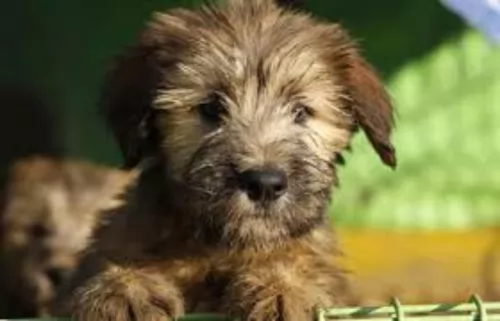 The Sapsali is a medium sized sheepdog standing at between 48 and 60cm in height and weighing between 16 and 27kg. He is a strong looking dog with the coat being long and dense and coming in quite a few color varieties. The coat can be solid in color but it can also be a mixture of blonde, reddish, brown and black. The hair of the dog also falls over the eyes.
The Sapsali is a medium sized sheepdog standing at between 48 and 60cm in height and weighing between 16 and 27kg. He is a strong looking dog with the coat being long and dense and coming in quite a few color varieties. The coat can be solid in color but it can also be a mixture of blonde, reddish, brown and black. The hair of the dog also falls over the eyes.
The dog has large eyes, the ears are also fairly large and the tail is long and held straight or down.
The dog is friendly, social and playful and also loving and loyal towards his human family. He is protective too and makes a good watchdog, but is never aggressive.
He gets on well with children as well as with other dogs. Training and socialization ensure obedience and good behavior and with a desire to please.
They’re intelligent dogs and training is easy. They’re gentle dogs too and this has made them a popular choice for therapy dogs. Their loving natures have been welcomed by patients suffering with trauma and the dog connects strongly with these people.
When back home he wants to be included in all the family activities. He is quite energetic and will require exercise every day – walks, hikes, frisbee, ball and rope games as well as more hectic hikes. He makes a good choice for the first time dog owner but is better suited to life in the suburbs or the countryside as opposed to being on a small property in the city.
 Your beautiful hunting dog is active and social and just loves to be out and about following a scent with other hunting dogs. This is what he absolutely loves to do.
Your beautiful hunting dog is active and social and just loves to be out and about following a scent with other hunting dogs. This is what he absolutely loves to do.
These days, apart from just hunting, he is also kept as a pet. He makes a good family companion because he is a non aggressive, gentle, even-tempered pet. Some of these dogs tend to be more reserved in nature. However your dog turns out, he can be your special friend when you give him all the exercise, nutrition and love that such a loyal dog deserves.
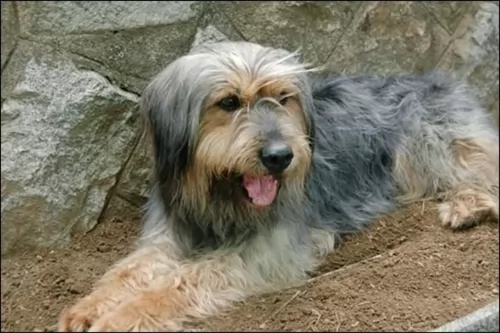 The beautiful Sapsali is a friendly, loving dog breed who is just a little bit wary around strangers.
The beautiful Sapsali is a friendly, loving dog breed who is just a little bit wary around strangers.
If he senses his master is alright around strangers, he will accept them too.
He is both protector and guard dog and gets on well with all members of the household. Apart from the long coat which can be a bit of a handful, this dog ticks all the right boxes in terms of being a most splendid family pet.
 As a dog not known for inherited health problems, the Grande Bleu de Gascogne, with good care, can live to be 12 years of age.
As a dog not known for inherited health problems, the Grande Bleu de Gascogne, with good care, can live to be 12 years of age.
Just like with other dog breeds, there are some conditions to which this dog may also be prone, and hip dysplasia is one.
The average litter size for the Grande Bleu de Gascogne is 4 to 7 puppies. It is important to prevent your puppy growing too quickly because this is precisely what leads to musculoskeletal problems as an adult.
If you're concerned about this, speak to your vet, as you want to do your best to prevent hip problems in the future.
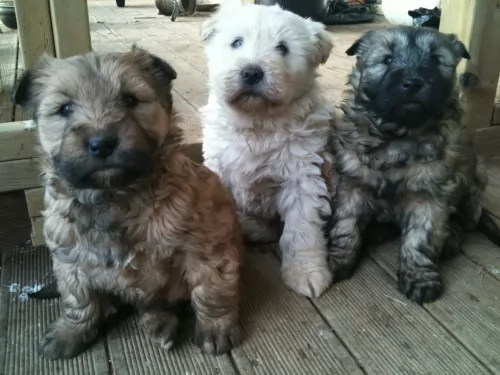 The Sapsali can live to be between 10 and 12 years of age, being a healthy breed. Like all purebreds, the dog will experience some health concerns, among which are heart disease, obesity, bloat, hip dysplasia and skin problems among others.
The Sapsali can live to be between 10 and 12 years of age, being a healthy breed. Like all purebreds, the dog will experience some health concerns, among which are heart disease, obesity, bloat, hip dysplasia and skin problems among others.
Dogs get heart disease just like human beings. The most common form of heart disease in dogs is valvular disease. Essentially it affects small breed dogs. Heartworm disease and dilated cardiomyopathy are also common forms of heart disease.
Sometimes there are symptoms and sometimes there aren’t, but as heart disease progresses it turns to congestive heart failure – the heart not being able to meet the body’s demands. Signs of this can be fatigue, difficulty with breathing, loss of appetite and weight loss, coughing and a distended abdomen.
If you see these signs, your pet will need to get to the vet. There is no cure for congestive heart failure but there are medications which can help the heart work better.
 Known for his hunting skills, the Grande Bleu de Gascogne has high exercise requirements. Although a walk is wonderful for him, it won't be enough. If you have a large garden, which will be ideal for him, throw the ball so he can fetch it. If you go cycling or jogging, he'll thank you for including him in these.
Known for his hunting skills, the Grande Bleu de Gascogne has high exercise requirements. Although a walk is wonderful for him, it won't be enough. If you have a large garden, which will be ideal for him, throw the ball so he can fetch it. If you go cycling or jogging, he'll thank you for including him in these.
The Grand Bleu’s short coat is conveniently low maintenance too so you aren't going to be spending anything on professional grooming. Give him a brush twice a week to remove loose hairs and to keep his coat silky and shiny.
Their long ears should be checked regularly for a build up of wax and dirt. Dampness can also be a problem if he loves to go swimming. You can buy special ear-cleaning-for-dog products. Never probe deep in the ears as you can damage them. Rather get advice from your vet or professional groomers on how to keep the inside of his ears clean and free from infection.
An energetic hunting scentdog like this requires high quality food with some raw meat added in from time to time. He must always have access to fresh, cool water.
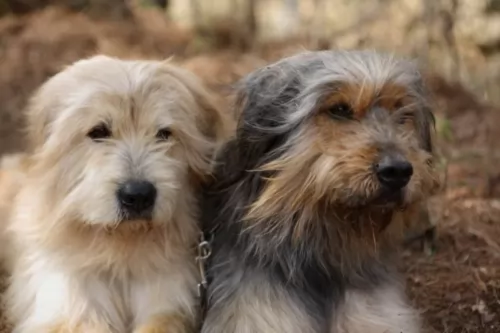 The Sapsali is covered in thick, long hair and the coat is going to require a lot of attention. It will be better to give the coat a brush every day as the coat can become very matted and tangled. The dog is also a heavy shedder so a regular brush will help to get rid of all that loose hair.
The Sapsali is covered in thick, long hair and the coat is going to require a lot of attention. It will be better to give the coat a brush every day as the coat can become very matted and tangled. The dog is also a heavy shedder so a regular brush will help to get rid of all that loose hair.
The Sapsali will need to have his ears, eyes and teeth regularly checked to ensure they are clear of any infection and to prevent any illnesses. A bad tooth can create many health issues throughout the dog’s body.
You can enhance your dog’s health by giving him good food. Commercially manufactured dog foods can be a good, convenient choice, more so if you choose the high quality ones known for their natural, quality ingredients.
To provide your dog with just a bit of variety in his diet, some home-made food added into the dry kibble from time to time will delight your pet. No need to make preparing the food a huge issue either. Boil brown rice and chicken in a pot and add in sweet potatoes, carrots and spinach.
Chop all this up and as a treat, add smaller portions of it into the dry kibble when you want to treat your dog. To avoid skin infections, try to include some raw meat into his diet occasionally. Never leave your pet without a constant source of fresh, cool water